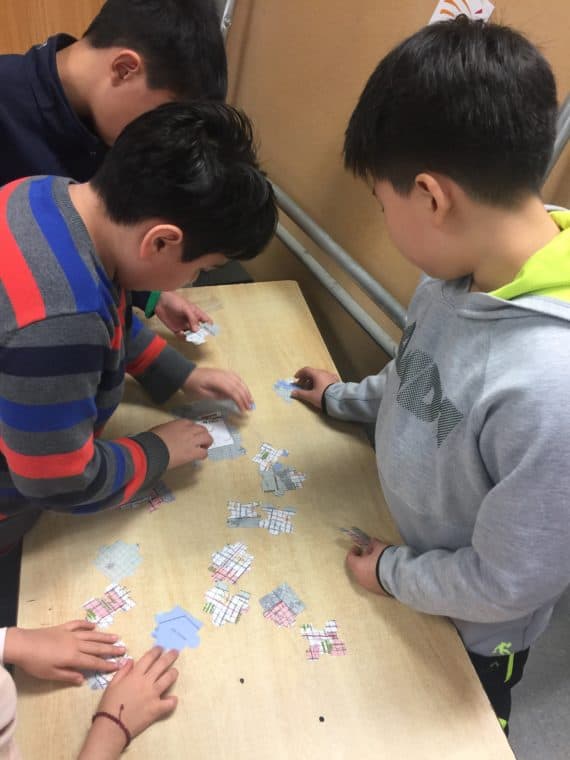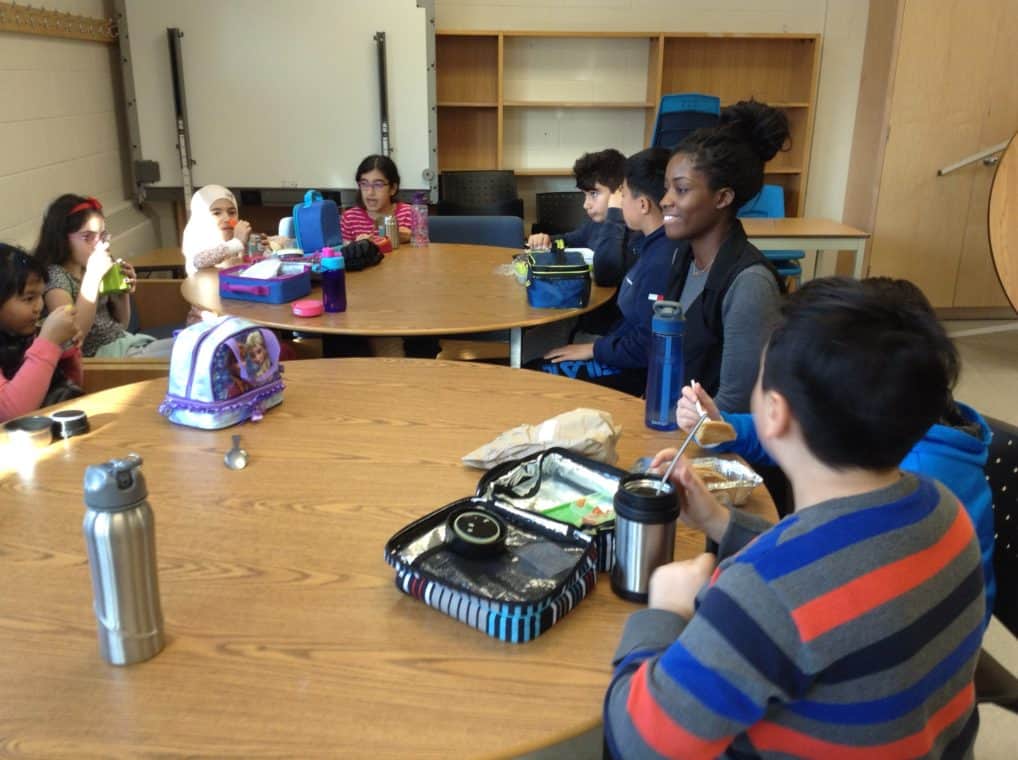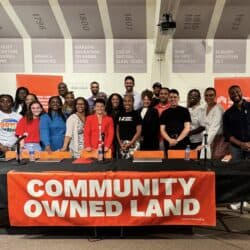This year marks the 40th anniversary of the Ontario Trillium Foundation. To mark the occasion, The Philanthropist Journal examines the impact the foundation has had on grantees, the non-profit sector, and Ontario communities.
Thousands of grants have been issued since the Ontario Trillium Foundation launched 40 years ago. While the grants vary in shape and size, all are given to projects that fall under OTF’s mandate to support the well-being of Ontario communities.
Directly affecting the lives of Ontarians
The Windsor-Essex Therapeutic Riding Association (WETRA) has received several OTF grants over a 20-year period. WETRA offers equine therapy to individuals with diverse needs in the Windsor-Essex community. “The grants definitely helped by expanding our opportunity to reach out to people who maybe have different types of special needs or circumstances that we hadn’t thought about,” says executive director Becky Mills.
In 2016, WETRA used an OTF grant to create the Horses Offering Outstanding Futures (HOOF) program for youth facing barriers. More recently, OTF grants have given WETRA the opportunity to add accessible parking spaces, provide staff members with computers, create a promotional video, and implement COVID-19-related safety measures.
OTF’s grants have allowed us to think outside of the box a little bit and go beyond our typical sort of bread-and-butter programs and work with different types of communities and different types of partners.
Katie Lowes, BBBS Peel York
OTF grants have also given Big Brothers Big Sisters (BBBS) of Peel York the opportunity to expand services and reach new communities. BBBS is a mentoring organization that offers developmental relationships for children and youth facing adversity. On January 1, 2022, the Peel and York branches unified to represent a larger swath of the community.
Katie Lowes, BBBS Peel York’s program manager, says OTF’s grants have allowed the organization to “think outside of the box a little bit and go beyond our typical sort of bread-and-butter programs and work with different types of communities and different types of partners.”
In 2020 and 2021, the Resilient Communities Fund allowed BBBS Peel York to hire new staff members to help the organization serve its community during the COVID-19 pandemic. The organization has also used OTF grants to support a Conversation Circle program for newcomer youth, expand the Teen Mentoring program, enhance outreach to racialized communities, and sustain pre-existing programs.
OTF’s early support of Pathways to Education – a program launched in 2001 to support high school students living in low-income communities – highlights the impact that funding can have on new organizations. At the time, OTF provided Pathways with the largest grant it had ever given, and what started as a local initiative for youth in Toronto’s Regent Park has since grown into a Canada-wide program.
“So that’s a huge story of success when you think about [Pathways to Education] in terms of how challenging in our sector it is to start something new and take it to scale,” says Blair Dimock, OTF’s vice-president of partnerships and measurement.
Developing the non-profit sector
OTF’s impact extends beyond direct support for individual organizations to the province’s non-profit sector at large. “The non-profit sector in Ontario is stronger, much stronger, today than it was 40 years ago, and I’d like to think that the foundation has played a large part in that,” says former OTF CEO Robin Cardozo.
“I don’t think we ever envisioned that OTF would, through our granting programs, help advance the non-profit sector the way that we’ve assisted them with capacity-building,” says current CEO Katharine Bambrick. “And I think partly because we’ve been around for 40 years, we’ve been a constant to be able to understand the non-profit and the charitable sector, to know what some of their challenges are, and then be able to provide some support and leadership for the sector.”
I don’t think we ever envisioned that OTF would, through our granting programs, help advance the non-profit sector the way that we’ve assisted them with capacity-building.
Katharine Bambrick, OTF
For Dimock, the foundation has provided meaningful support to non-profits and enhanced professionalism within the sector, resulting in “fewer small volunteer organizations being run out of someone’s basement and more organizations with professional staff and more sustainable organizational infrastructures.” The existence of the foundation, he adds, has also helped develop a culture of volunteerism as more Ontarians engage in their communities.
Another tool OTF uses to support the sector is collaborating with organizations like the Foundation for Black Communities (FFBC) through its Partnership Investments program. FFBC is a philanthropic organization dedicated to investing in Black-led charities, non-profits, and grassroots organizations. OTF has provided FFBC operational support and funding that has allowed the foundation to launch some of its activities, including organizational development and grantmaking. OTF has also invested in FFBC by seconding two full-time Black staff members who have assisted in the design and delivery of the foundation’s community investment strategy.
OTF has ceded much power and sought direction from FFBC on how we want to be supported, where we want to be supported, and when.
Liban Abokor, Foundation for Black Communities
Asked about the partnership with OTF, FFBC co-founder Liban Abokor says, “It’s been empowering and unconventional in the sense that OTF has ceded much power and sought direction from FFBC on how we want to be supported, where we want to be supported, and when.”

newcomer children to build social and emotional competencies and develop strong language
skills.
Lasting partnerships
Over the past 40 years, Ontario’s non-profit sector has matured considerably, partly due to increased emphasis on collaboration and partnerships between organizations. OTF’s Partnership Investments program is explicitly designed to build relationships between the non-profit, private, and public sectors.
While many parts of the sector remain dependent on government funding, Cardozo says non-profits have enhanced their resiliency and developed new funding sources, including “social enterprise, things like memberships, partnerships, working with other sectors, and generally finding alternative ways to supplement their government’s revenues.”
FFBC exemplified this by leveraging its connection with OTF to develop new relationships with Canadian Tire, Sun Life, and the MLSE Foundation. Through these partnerships, FFBC has raised more than two million dollars. “Most funders just simply say, ‘Here’s my dollar and good luck,’” Abokor explains. “OTF has said, ‘Not only are we going to make sure that we support you, we’re going to make sure that all of our relationships are animated and activated.’”
10C, a community gathering space in Guelph, received OTF seed and capital funding to grow the organization before participating in the foundation’s partnership activities. It has since leveraged its relationship with OTF to participate in the Catalyst Community Finance Initiative (CCFI). Alongside OTF and 10C, CCFI is made up of several funders and organizations, including Pillar Nonprofit Network, financial services non-profit SVX, and the United Church of Canada, among others. The multi-year initiative was established to examine infrastructure in social finance and provide support for community finance organizations in local communities. In practice, much of the partnership involves knowledge and resource sharing among the network, conducting research, and identifying and advocating policy interventions.
“I’d say that the partnership method that OTF has to work with different organizations is by far the most engaged as far as the funder, and project, and community-development relationship,” says 10C executive director Julia Grady.
On the very ground level, OTF became heavily involved in how Mass Culture is shaped.
Robin Sokoloski, Mass Culture
Meanwhile, for an emerging organization like Mass Culture, a partnership with OTF has been monumental. Mass Culture is a national organization that mobilizes data and research for the benefit of the arts and culture sector. Part of this work includes bridging the gap between academia, funders, and the arts sector.
Through OTF’s Partnership Investments program, Mass Culture was connected with OCAD University’s Strategic Foresight and Innovation program, where students helped design and establish an initial business plan and value proposition for the organization. “On the very ground level, OTF became heavily involved in how Mass Culture is shaped,” says Robin Sokoloski, Mass Culture’s director of organizational development.
Encouraging measurement, evaluation, and digitization
In the spirit of professionalizing the sector, OTF has supported organizations in digitizing and leveraging data measurement.
Bambrick says that using data to measure impact can provide new opportunities for generating revenue. “Data and business intelligence is an area that the sector is starting to recognize,” she says. “Decision-making, based on evidence, is becoming more and more important in the kind of work that [non-profits] are doing. And we try to assist them in that.”
Dimock echoes this, noting that OTF supports the use of data to advance the work of non-profits: “We continue to put a lot of energy and resources into making sure that we’re making the very best use of the best information available to inform not just our own decisions, but to help the grantees that we’re funding know more about … what they’re doing well or not that they can use for their benefit.”
From the perspective of the arts sector, Sokoloski believes evidence-based research is critical to growth. “What can be a commonality amongst [the sector] is knowledge,” she says, adding that robust research can provide “information that can be relied upon.”
For individual organizations, OTF’s support around technology and digitization has been especially meaningful amid the COVID-19 pandemic. For BBBS Peel York, the new position of systems integration coordinator was established with OTF’s support. “Having actual reliable, effective [digital communications] increases our efficiency and effectiveness as an organization,” says Susan Nomi, director of programs.

York, provides opportunities for self-expression, English language skill development, and
supportive interactions with mentors.
Looking ahead
Undoubtedly, OTF has shaped non-profits and Ontario communities since its founding 40 years ago. Moving forward, stakeholders recommend that OTF prioritize sector-wide support, accessibility, and sustainable long-term funding.
“There isn’t a single community that you’re going to go into across Ontario where a service that is much loved and needed by the community isn’t supported by OTF,” Abokor says. “The challenge is, how do they do that in all communities with a focus on culturally relevant service-delivery partners.” He adds that OTF should continue to provide funding for organizational development, not just programming.
There isn’t a single community across Ontario where a service that is much loved and needed by the community isn’t supported by OTF. The challenge is, how do they do that in all communities with a focus on culturally relevant service-delivery partners.
Liban Abokor
Sokoloski remains hopeful that funders like OTF will increase involvement with the projects they are supporting. She looks forward to “figuring out ways to develop these community clusters where people can work together and potentially shift the power dynamic between the funder and the fundee.”
For organizations like BBBS Peel York, continuing OTF’s history of funding local initiatives is paramount. “If [OTF] is looking to provide these kinds of services moving forward, which I’m sure they will be, we’re an organization that’s ready to meet the needs of our community. And with their help, we can do that,” Lowes says.


